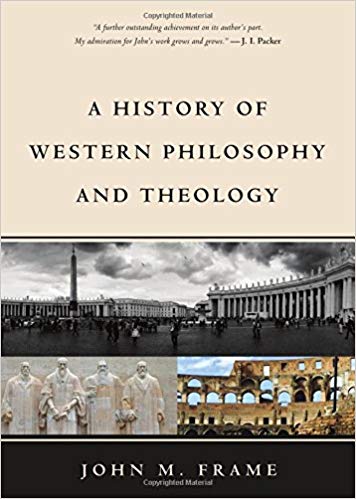Recommended Reading
From Amazon.com: "Christians should evaluate philosophy by biblical criteria. This will shed greater light on the developments in the history of philosophy and better prepare us for the intellectual challenges of our time. The fall of Adam brought intellectual as well as moral corruption on the human race, and the effects of the fall can be seen in the work of philosophers, most of whom try to understand the world autonomously through reasoning apart from God's revelation. Some philosophers have appealed to God's revelation, but their work has often been compromised with the wisdom of the world. Revelation should inform reason, and not the other way round. In the past, even Christian theology was corrupted by the movement toward intellectual autonomy, creating the tradition of liberalism, which has unhappily dominated academic theology down to the present day. But there is hope a new generation of Christian thinkers take God's Word seriously. Frame's unique new contribution augments that process."
If you purchase from one of our Amazon.com links, we receive a small commission that helps support this site and does not cost you any extra.
Seminary Degrees
If you're curious about the various seminary degrees offered by most seminaries and divinity schools (including theology degrees available online), hopefully the list here will help you sort through the forest of acronyms!

MDiv - Master of Divinity
The MDiv - Master of Divinity - is the standard of seminary degrees offered by the vast majority of seminaries and divinity schools. It is a three-year degree and offers a wide range of courses in biblical studies, systematic theology, biblical languages, church history, philosophy, practical theology, counseling, preaching, and other courses related to both the academic study and practice of theology.
Many seminaries allow a student to have a concentration (e.g. theology, Old Testament) for their MDiv work while others simply allow students to use their electives however they see fit. Generally, internships are part of the MDiv curriculum as well. Though it depends on the program, most schools allow students to pursue internships part-time during the year, full-time during the summer, or a full-time year long internship (which extends the program to four years). Given the popularity of the MDiv, it should also be no surprise that there are many online Master of Divinity degrees available, though you should view them with caution.
In case you were curious, the MDiv degree was formerly known as a BD (Bachelor of Divinity) in the US. Since there could be easy confusion about the BD degree (it isn't equivalent to undergraduate work), the switch to MDiv aims to make the graduate level of study clear.
MA - Master of Arts
The MA - Master of Arts - is another degree commonly awarded by many seminaries. A seminary-based MA may be granted in a wide range of subjects common to the seminary curriculum - Old Testament, New Testament, theology, church history, counseling, youth ministry. Many MA programs will require the student to write a thesis as part of the degree requirements.
MATS - Master of Arts in Theological Studies
MTS - Master of Theological Studies
Another common degree is the MATS or MTS degree - Master of Arts in Theological Studies or Master of Theological Studies. Usually, an MATS or MTS contains most of the same courses as an MDiv degree with the exception of practical ministry, preaching, and church internships. For students who are using seminary to prepare for further graduate study or who have no interest in pursuing church ministry, the MATS or MTS degrees are a common choice.
ThM - Master of Theology
The ThM degree (Master of Theology) is an advanced academic degree awarded after one year of full-time study after the MDiv degree. During ThM studies, you will pick an area of concentration such as biblical studies, church history, theology, or another area of academics common to seminary study. Most programs require a thesis or series of research essays as requirements for graduation.
Once exception that I know of to standard ThM practice is seen at Dallas Theological Seminary. Instead of a separate MDiv or ThM degree, they offer the ThM as their foundational degree, taking four years to complete.
DMin - Doctor of Ministry
Many seminaries offer the DMin or Doctor of Ministry degree. The DMin degree should not be confused with the PhD degree, which is the highest academic degree available in the US. By contrast, a DMin degree is typically focused on practical ministry, aiming to educate ministers and christian counselors about how to better serve their congregations, denominations, or clients. In addition to coursework, DMin programs require their students to complete a research project in their major field of study.
PhD - Doctor of Philosophy
A number of seminaries offer the PhD (Doctor of Philosophy) in theological disciplines such as biblical studies, theology, church history, homiletics, and other related fields. Like other PhD programs, the students must complete a number of graduate-level courses, pass a series of comprehensive examinations, and write a doctoral dissertation on an approved subject. The typical length of study is five to seven years. Of all the seminary degrees listed here, the PhD is considered the highest academic degree.
ThD - Doctor of Theology
Other schools award the ThD (Doctor of Theology) in lieu of the PhD degree. Aside from the naming difference, the requirements for a ThD are exactly the same as they are for a PhD, though some secular schools might prefer a professorial candidate to have the PhD instead of a ThD.
Seminary Degrees - Final Words
These are most seminary degrees awarded by seminaries and divinity schools in the United States. There are a few more specialized degrees (e.g. MARE - Master of Arts in Religious Education) but they tend to fall under one of the above descriptions. If you have any questions, please let me know!

